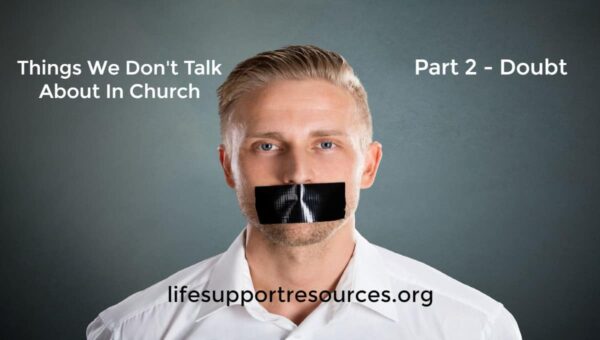Doubt Comes With The Territory
At LifeSupport, our craft is telling stories. We study the stories we collect and we see a lot of consistency in the way people talk and feel about their mental health struggles. One common area that people struggle with is doubt in God. We often hear during our interviews that people feel shame over the doubts they have.
Doubt is an easy road when we are faced with challenges of life, particularly so when faced with mental health struggles (either our own or those of a loved one). I have a friend who says he never doubts in God. I don’t believe him. I may be wrong, but I believe doubt is a part of our flawed humanity. Doubt may lie dormant and hidden in some of us, but when life gets difficult, doubt awakens, and without care it can take control.
The bible is riddled with passages that acknowledge doubt as a condition common to men and women. In our current world, where newscasters seem to share more negative stories than positive, where connectedness breeds division rather than unity, and where God seems less and less visible in everyday life, is it any wonder that doubt is still a part of our reality?
All LifeSupport Resources
Are FREE For Ministry Use
The Dangerous Side-effects Of Doubt
- Doubt Isolates Us from Other Believers – when someone thinks that their doubt is abnormal they try to hide it. Any time we attempt to conceal part of ourselves (even from those closest to us), we begin to isolate. The more we isolate, the more we listen to our own voice rather than the voices of those who wish to love and support us. Listening to a large dose of self-talk when struggling with mental health tends to feed shame and so, more isolation.
- Doubt Feeds Fear – As a believer, I sometimes have times when my faith is challenged. When I see God as not having ultimate control, I tend to believe that if God isn’t in control, I must be. My response to that loss of connection to my faith is to fear what might happen as a result of me being in control of my life. As a believer, if I start to think that God isn’t really who I thought he was, then almost anything or anyone could influence what happens in my life. When the surety and eternal truth of God is replaced with doubt, fear is bound to grow.
- Doubt Changes our Self Image – Sadly, most of us know people who have turned from their faith. Many of those experienced doubt, and told themselves (or were told by others) that they should simply believe in themselves. When we doubt God we tell ourselves that we are capable of doing life on our own. Our doubt interferes with our ability to see our lives in terms of God’s plan. The problem is that this seems to work for a time. Eventually though, life becomes too much for us to bear without the sustenance of God. As most of us have seen, the resulting collapse is accompanied by pain and destroyed relationships, and sometimes death.
So What Can We Do About It?
Don’t Pretend It Doesn’t Happen
Most of us are hesitant to talk about the parts of life that challenge us. We tend to make ourselves look like what we think of as “normal”. The problem with trying to look normal is that we each can have our own definition of what “normal” is. People tend to take their cues from others about what they think they should look and act like. In the case of believers, someone who is struggling will look to those they perceive as “good Christians” or their church leaders. People may be suffering silently while trying to mold themselves to look like the people they believe have it all together. One of the ways we tend to “keep up appearances” as Christians is to hide our doubt. The fact that all of us experience doubt in God from time to time seems like something we should hide. The fact that we rarely seem to talk about doubt as a normal part of the life of a Christian feeds the stigma that people perceive.
As a church leader, being open about your own doubt has a tremendous effect on people who are looking for cues as to how to deal with their own. You can help counter the stigma of doubt by sharing your own stories of doubt AND the way you responded to that doubt. Offer specific strategies and biblical examples that helped you fight back doubt.
Start some conversations about doubt in your church
Someone is afraid to ask you about this and they need your help (that may be someone on your staff). Here are a few ideas to get discussions started in your lobby, office or in a group setting:
- Why do we doubt God?
- Why doesn’t God eliminate our doubt?
- What are some examples of doubt in the bible? How do those help us understand our own doubt?
- If there are times in your life when you struggled most with doubt, can you identify any reason that you were more prone to doubt in those particular times?
- What do you do (or what could you do) to defend against doubt?

